EC from DC - September 26, 2014
Last week, I signed onto a very important piece of legislation. H.R. 2821, the American Jobs Act, introduced by my colleague, Rep. Frederica Wilson, would do so much to strengthen and grow our economy and put Americans back to work.
- The American Jobs Act would strengthen our economy by cutting taxes for working Americans, restoring emergency unemployment insurance, investing in infrastructure, and helping to put unemployed Americans back to work.
- It would put money in the pockets of tens of millions of low and middle income Americans by reinstituting the Making Work Pay Credit, providing a tax credit equal to 6.2% of earnings, up to a maximum credit of $400 individuals and $800 for couples.
- The American Jobs Act would make innovative and necessary improvements to the Unemployment Insurance program. It would create reforms to help the unemployed return to work, including the "Bridge to Work" program which allows people who are receiving Emergency Unemployment Insurance to take temporary work or pursue on-the-job training.
- The bill would facilitate rebuilding our nation's crumbling infrastructure through grants for airport projects, air traffic control systems, highway and bridge rehabilitation, high-speed rail projects, Amtrak, and various other transit projects, all of which are proven job creating policies.
- The American Jobs Act ends sequestration and raises revenue by capping individual tax deductions and exclusions for high income taxpayers, repealing deductions for oil and natural gas exploration, and closing loopholes like carried interest and corporate jet depreciation.
While I am in Washington this week working on a number of projects, Congress is not in session. We have begun our district work period. While I truly love and appreciate hearing from and talking with my constituents, I believe we have more work to do. We need to stop kicking the can down the road and tackle the real issues.
We need to start creating jobs through the Make It In America plan, advancing workplace equality through support for the Paycheck Fairness Act, and making high-quality education more affordable and accessible. We need to bring legislation to the Floor to rebuild our roads, bridges, and critical infrastructure; to make higher education more affordable and expand early childhood education; and to address other critical issues that the majority of Americans support and that will expand opportunity for the middle class, including passing comprehensive immigration reform, and most importantly, to raise the minimum wage to $10.10 an hour, providing 25 million Americans with a raise.
Let me share with you some facts and figures about the minimum wage. First, the minimum wage is not what it used to be. Today, the real value of the minimum wage has fallen by nearly one-third since its peak in 1968. And right now, a full-time minimum wage worker makes $14,500 a year, which leaves too many families struggling to make ends meet.
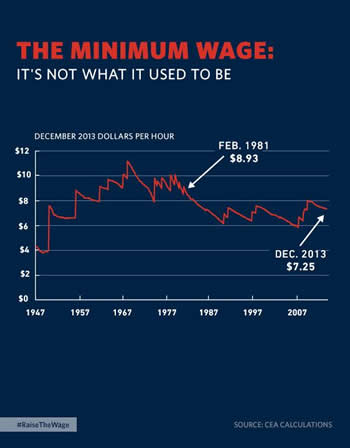 |
Think the minimum wage is just for students and young workers? Think again. Raising the federal minimum wage would not only benefit more than 28 million workers across the country, but 19 million workers from all types of households would see a direct increase in their wages. 599,600 workers in Missouri would benefit.
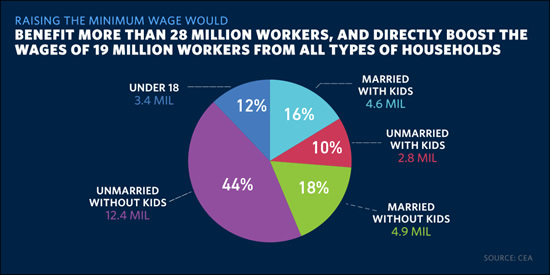 |
Working families depend on the minimum wage to get by. Why are we leaving them behind?
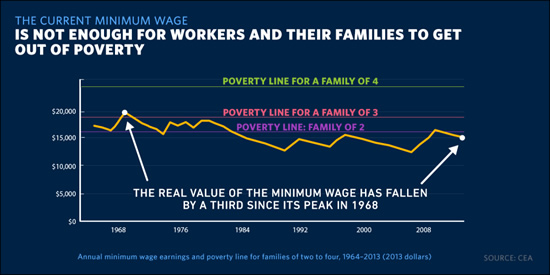 |
We can and we must do better.
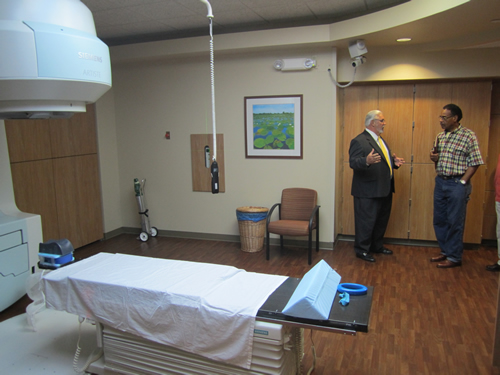 |
This week, I was pleased to announce that the Department of Health and Human Services (HHS) has awarded nearly $1.8 million dollars to the National Rural Health Association (NRHA), based in Kansas City, as part of the Association's Rural Health Best Practices and Community Development Cooperative Agreement. Why is this important? People in rural areas have even greater problems than those in urban areas when it comes to gaining access to health care, as there are fewer doctors, and patients must travel farther to get services in their times of need.
It is critical to increase the resources available to rural residents, in Missouri's Fifth District and all around our nation. Make no mistake, these funds will save lives. I am thrilled that the NRHA has received this grant to help our nation's most vulnerable individuals and families.
In recent years great advancement has been made in rural health, with the NRHA at the forefront of this effort. The association has been key in increasing funding for training and tuition assistance for health care workers, as well as introducing legislation to provide equal Medicare payments for the same services to both urban and rural providers. Additionally, the NRHA maintains strong ties with HHS and the Secretary to keep the Department apprised of rural matters and policy recommendations. I look forward to continuing to work with the NRHA to increase access to rural health.
This week's announcement of $1,799,829.00 in funds is an annual allocation, as part of a five year plan authorized by HHS. The NRHA, whose headquarters are located in Missouri's Fifth Congressional District, is a national nonprofit membership alliance, consisting of over 20,000 member organizations. The association provides leadership to health care providers facing the unique challenges of a rural environment, including economic inadequacies, cultural differences, educational deficiencies, staffing and funding shortcomings, and the difficulty of distance and isolation. More information about the unique combination of factors that affect rural health care can be found here.
I want to shed a light on two great leaders in our Missouri community whom I ran into the other day: Dr. Ed Gettemeier, principal of Hardin Middle School in the St. Charles School District and Dr. Jason Snodgrass, principal at Fort Osage High School.
The Missouri Association of Secondary School Principals (MASSP) selected Dr. Ed Gettemeier as the 2014 Missouri Middle School Principal of the Year and Dr. Jason Snodgrass as the 2014 Missouri High School Principal of the Year. MASSP officially presented the awards during the annual MASSP Spring Conference at the Lodge of Four Seasons, Lake Ozark, Mo., on Monday, March 31, 2014. They were awarded the recognition based on their impact in the areas of collaborative leadership; curriculum, instruction and assessment; and personalization of the learning environment.
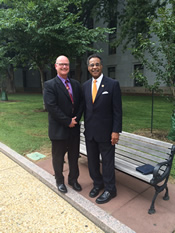 |
Dr. Ed Gettemeier, Hardin Middle School in the St. Charles School District
Superintendent Jeff Marion wrote, "Dr. Gettemeier has modeled for students and staff a work ethic that is second to none," and that he has "been a leader in the district's efforts to implement Standards-Based Grading."
The selection was made from more than 400 middle school principals from throughout Missouri. Dr. Gettemeier taught in the Francis Howell School District (1997-2001) and served as athletic director and then assistant principal at Francis Howell North High School (2001-2009) before he was named the principal at Hardin Middle School in St. Charles in 2009. He received a Masters in Education (1992) at Southern Illinois University at Edwardsville, an Ed. Specialist (2009) and a Doctorate in Educational Administration from Lindenwood University (2012).
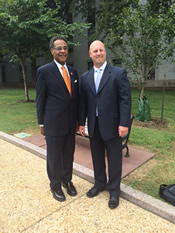 |
Dr. Jason Snodgrass, Fort Osage High School
Assistant Superintendent Maria Fleming wrote, "Jason is the most focused, persistent and goal-oriented building administrator with whom I've ever had the opportunity to work." She described his efforts to increase achievement at the high school. She continued, "Over the course of five years he has led the charge to improve student outcomes…" which led to increases in the ACT composite score from 20.9 to 21.3 while increasing the number of students tested by 10%.
The selection was made from more than 600 high school principals from throughout Missouri. Dr. Snodgrass served as principal at Marceline High School (2002-2003), Polo High School (2003-2009) and has been principal at Fort Osage High School since 2009. He received a Bachelor of Science (1997) at Central Missouri State University, a Master in Secondary Administration (2000), an Ed. Specialist from Northwest Missouri State University (2003) and a Doctorate in Educational Leadership (2010) at St. Louis University.
Join me in thanking these gentlemen, and thank an educator who has made a difference in your life.

Did you know that September is National Preparedness Month? At this time of year, we ask you, your family, community and workplace to take a moment and plan how you will communicate with loved ones during an emergency. No one wants to think that the worst can come, but we must be prepared just in case. Take time to plan with your family exactly how you will contact them to let them know if you're OK in a disaster. Ready.gov has an emergency plan for families already established at https://www.fema.gov/media-library/assets/documents/34330. You should also ask about plans at your workplace, daycare, faith-based organization.